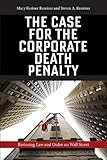The Case for the Corporate Death Penalty : Restoring Law and Order on Wall Street / Steven A. Ramirez, Mary Kreiner Ramirez.
Material type: Computer filePublisher: New York, NY : New York University Press, [2017]Copyright date: ©2017Description: 1 online resourceContent type:
Computer filePublisher: New York, NY : New York University Press, [2017]Copyright date: ©2017Description: 1 online resourceContent type: - 9781479878529
- Derivative securities -- United States
- Financial institutions -- Corrupt practices -- United States
- Financial institutions -- Government policy -- United States
- Financial services industry -- Government policy -- United States
- Global Financial Crisis, 2008-2009
- Subprime mortgage loans -- United States
- LAW / Banking
- Corporate
- Crime
- Policing
- authorities
- economics
- financial
- 332.10973 23
- HG181 .R36 2017
- online - DeGruyter
| Item type | Current library | Call number | URL | Status | Notes | Barcode | |
|---|---|---|---|---|---|---|---|
 eBook
eBook
|
Biblioteca "Angelicum" Pont. Univ. S.Tommaso d'Aquino Nuvola online | online - DeGruyter (Browse shelf(Opens below)) | Online access | Not for loan (Accesso limitato) | Accesso per gli utenti autorizzati / Access for authorized users | (dgr)9781479878529 |
Browsing Biblioteca "Angelicum" Pont. Univ. S.Tommaso d'Aquino shelves, Shelving location: Nuvola online Close shelf browser (Hides shelf browser)

|

|

|

|

|

|

|
||
| online - DeGruyter Coming Out of Communism : The Emergence of LGBT Activism in Eastern Europe / | online - DeGruyter 1929 : Mapping the Jewish World / | online - DeGruyter The Movement for Reproductive Justice : Empowering Women of Color through Social Activism / | online - DeGruyter The Case for the Corporate Death Penalty : Restoring Law and Order on Wall Street / | online - DeGruyter Punishment in Popular Culture / | online - DeGruyter The Violence of Care : Rape Victims, Forensic Nurses, and Sexual Assault Intervention / | online - DeGruyter Privilege Revealed : How Invisible Preference Undermines America / |
restricted access online access with authorization star
http://purl.org/coar/access_right/c_16ec
A critical examination of the wrongdoing underlying the 2008 financial crisisAn unprecedented breakdown in the rule of law occurred in the United States after the 2008 financial collapse. Bank of America, JPMorgan, Citigroup, Goldman Sachs, and other large banks settled securities fraud claims with the Securities and Exchange Commission for failing to disclose the risks of subprime mortgages they sold to the investing public. But a corporation cannot commit fraud except through human beings working at and managing the firm. Rather than breaking up these powerful megabanks, essentially imposing a corporate death penalty, the government simply accepted fines that essentially punished innocent shareholders instead of senior leaders at the megabanks. It allowed the real wrongdoers to walk away from criminal responsibility. In The Case for the Corporate Death Penalty, Mary Kreiner Ramirez and Steven A. Ramirez examine the best available evidence about the wrongdoing underlying the financial crisis. They reveal that the government failed to use its most powerful law enforcement tools despite overwhelming proof of wide-ranging and large-scale fraud on Wall Street before, during, and after the crisis. The pattern of criminal indulgences exposes the onset of a new degree of crony capitalism in which the most economically and political powerful can commit financial crimes of vast scale with criminal and regulatory immunity. A new economic royalty has seized the commanding heights of our economy through their control of trillions in corporate and individual wealth and their ability to dispense patronage. The Case for the Corporate Death Penalty shows that this new lawlessness poses a profound threat that urgently demands political action and proposes attainable measures to restore the rule of law in the financial sector.
Mode of access: Internet via World Wide Web.
In English.
Description based on online resource; title from PDF title page (publisher's Web site, viewed 26. Mrz 2024)


